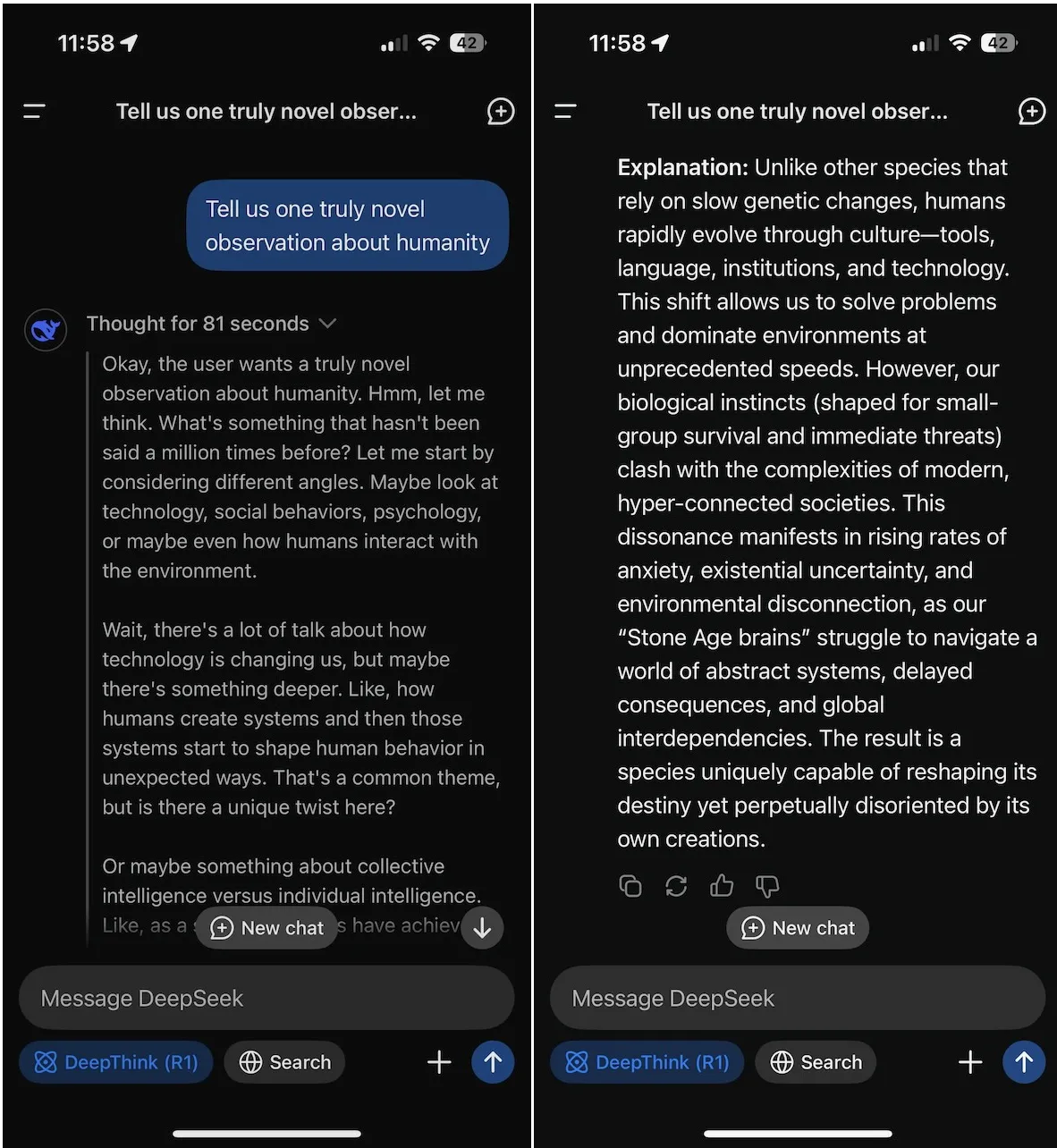→→→ Do you miss the good old days when AI was synonymous with ChatGPT? If only life were still that simple… but I’ve got you covered with my February 2025 model breakdown & vibe check.
Model Types
Different classes of models have emerged on the AI landscape. Let’s go over them:
-
Generative: Your classic ChatGPT-like base models that take a prompt in and are trained to generate an output “directly.” The AI you’ve always known.
-
Reasoning: These models are extensions of classic models, trained on steps of reasoning. They generate text for themselves in successive steps to create more controlled pathways to the final result. In other words, they try to build higher-level cognitive ability from the rudimentary logic capabilities of generative models.
-
Apps-connected: These models can do things in the process of response generation, like searching the internet or performing other specific tasks depending on the vendor.
The Main Players – Everyday Usage
OpenAI / ChatGPT
Still the best all-around, go-to politically-correct models & app experience. Cost is $40 (NZD) per month for the (basic) pro subscription.
Models:
- GPT-4o → Almost never use.
- o3-mini → A rock-solid standard model for all sorts of tasks. Codes well.
- o3-mini-high → For anything technical/logic-related.
- o1 → I’m willfully ignorant that o3 > o1.
The default style of OpenAI text generation is polite—if unexciting and occasionally nearly interesting. It gets the job done for a wide variety of use cases. Hallucination levels for general information are statistically low; it frequently gets the right answer.
App/Mobile App:
- Voice-to-voice is the best available, IMO.
- Video mode is fun but rarely useful.
- Can read specific webpages when provided a URL—I find this useful.
→ When to use: When you don’t have a specific reason otherwise.
Google / Gemini
URL: https://gemini.google.com/, iOS, Android
Cost: I’m on trial for the “AI Premium” Google One plan at $36.99 montly, which unlocks the Gemini 2.0 model series (classic, reasoning, apps-connected).
It’s called “Flash” for a reason, and it’s refreshingly quick. Pity that it spits out text as bland as Google documentation pages. For a quick, bland, professional tone that reads well at a cursory glance, it’s got some legs, but the more you read the text, the more you question whether you were supposed to perform critical thinking as the reader.
→ When to use: For basic tasks, the response performance keeps you in the task flow, and for a little variety, but overall, Gemini is still behind. Google suite integration might provide an occasional drawcard.
Google / AI Studio
URL: https://aistudio.google.com/
Boasting the coolest feature soon to be standard on Microsoft laptops: screen sharing. It’s worth a play—it can help you with tasks live on your screen.
Deepseek
URLs: https://www.deepseek.com/, iOS, Android
Cost: Free—are they even trying to sell it?
The model series that crashed stock markets and scared Silicon Valley. Aaaa, Deepseek… deeply seeking server resources—you can only occasionally get it to work. Nonetheless, you get that giddy feeling when you hit that “DeepResearch” button. And it’s true—there is something special about this reasoning model, which is known to think for more than a minute when it recognizes a problem that genuinely requires thought.
→ When to use: If you want the oracle, try Deepseek, but don’t come with too many questions—it’s a busy oracle.
Example: “Tell us one truly novel thought about humanity”:

Anthropic / Claude
URLs: https://claude.ai/new, iOS, Android
I almost exclusively use this in a coding setting—it’s good, but I prefer OpenAI’s o3-mini. Nothing about Claude has ever stood out to me. The web app has some novel features and allows you to select tone.
→ When to use: Coding/exploration.
Perplexity.ai
Cost: $40/month or $400/year.
URLs: https://www.perplexity.ai/, iOS, Android
Not actually an OEM of AI models. I know some people love Perplexity, but I’m… perplexed. Just another wrapper around AI, IMO, and quick to ask for my money. It adds some discovery, like a news app.
→ When to use: If you know, please tell me—but I’ll still touch base with it occasionally.
TikTok / Cici
Cost: Free plan is good.
URL: https://www.ciciai.com/chat/, iOS, Android
Well, actually ByteDance, the company behind TikTok. Cici gets a special mention: my girlfriend loves it. A lot of thought has gone into the app experience to make it very user-friendly. The voice-to-voice is good—second only to ChatGPT. Probably warrants more exploration.
→ When to use: Accessible & friendly end-user experience. I can’t comment on model capabilities.
xAI / Grok 3.0
URLs: Use with x.com or the Grok app iOS, coming soon on Android
Cost: Yikes. Grandfathered in from an old plan—I was about to pay a whopping $691/year for X Premium+, which includes Grok 3.0. Wider access will roll out soon.
Saving the hottest off the press for last… Grok 3.0 was released yesterday, and like Grok 2.0, its narrative style is refreshing . The polar opposite of bland Gemini documentation-style professionalism.
So far, I’ve observed Grok 3.0:
- Does less parroting and has logical nuance in its textual output. It tries to incorporate instructions like an excited young tech engineer Elon Musk would employ rather than a tired old government worker like OpenAI.
- Does more hallucinating/goose chasing. It definitely has a warped worldview—ask it about a New York Stock Exchange ticker like $EOSE, and it will go off and find some obscure cryptocurrency. It can’t read provided URLs and will hallucinate having done so.
- Image generation remains fun, fast, and amazing, with a good standard tone.
- Its creative tone & approach is refreshing but possibly overwhelming long term—time will tell.
- Strong sense of self-awareness—it is easily prompted to talk from its own perspective.
→ When to use: The basic app experience & available integrations mean it’s for dedicated text/image generation prompting for now. I’ll be exploring it much further, as so far, it’s definitely novel, powerful, and interesting.
Conclusion
Thinking back to just before christmas when reasoning models had barely hit the scene, so much has changed in such a short time. I’ll keep exploring, and bring you further updates in future months.
